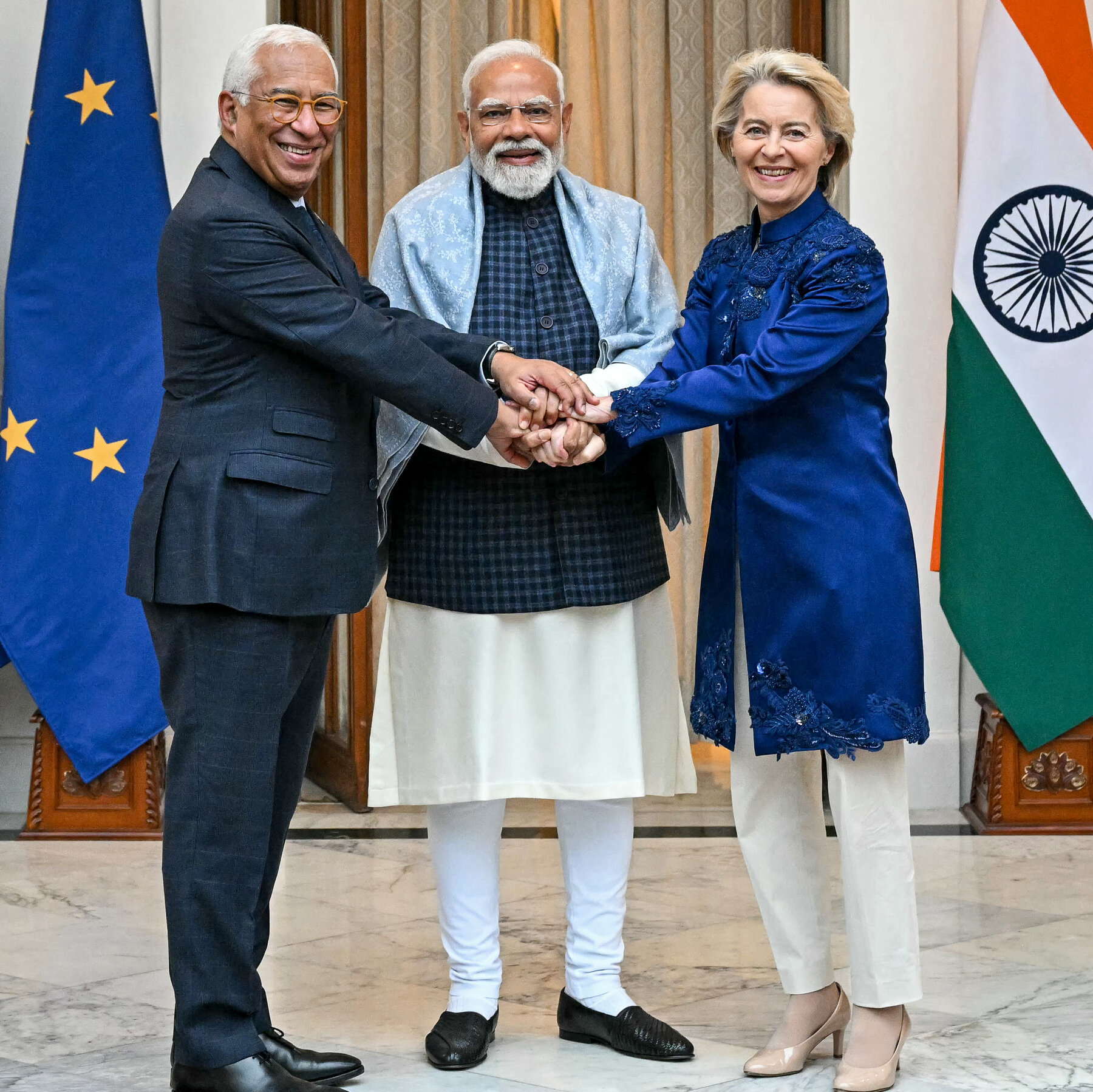


Andrew here. We’re taking a look at how markets are staying buoyant amid the debate over when the Fed might cut rates, and how tariffs — and President Trump’s continued pressure on the central bank to lower borrowing costs — could influence the outcome.
We also surveyed corporate governance experts on their reactions to Andreessen Horowitz’s call for companies to leave Delaware. And for those of you playing around with A.I., the C.E.O. of Honeywell tells us his best tips and tricks.
Rising tariffs … and stocks?
Another day, another round of tariff threats from President Trump — and another record for the S&P 500. What gives?
It could be the result of growing market optimism about an interest-rate cut, or relief that some companies have started delivering surprisingly upbeat results. (More on that below). Or, it could be a bit of “TACO trade” déjà vu, with investors convinced that Trump will back down on trade again.
But Jamie Dimon of JPMorgan Chase offered another explanation on Thursday: “Unfortunately, I think there is complacency in the markets.”
The latest: Trump said on Thursday that he would impose a 35 percent levy on Canada, effective Aug. 1, and that he planned to raise baseline tariffs on all trading partners to between 15 percent to 20 percent, from 10 percent. “I think the tariffs have been very well-received,” he told NBC News. “The stock market hit a new high today.”
Despite the trade fight escalation, S&P 500 futures on Friday are down only slightly.
But the trade picture could start getting muddled. Vietnam was surprised by the 20 percent tariff figure that Trump announced last week, according to Bloomberg, and reportedly is looking to negotiate better trade terms. In fact, Hanoi still has not formally accepted key details of what the White House presented as an agreed-upon deal and major victory, Politico adds.
That gets at a big question hanging over global markets: Should investors take Trump at his word? “You have to call his bluff at this point,” Patrick Armstrong, chief investment officer at Plurimi Wealth, told Bloomberg Television on Friday.
Interest rates are also weighing on investors. Lower borrowing costs could give households relief and boost corporate profit. Trump kept up the pressure campaign on the Fed: “COUNTRY IS NOW ‘BACK.’ A GREAT CREDIT! FED SHOULD RAPIDLY LOWER RATE TO REFLECT THIS STRENGTH,” he wrote on Truth Social on Thursday
But the central bank’s key policymakers remain divided. In Trump’s camp is Christopher Waller, a Trump appointee considered to be a candidate for Fed chair next year, who’s open to lowering borrowing costs at the next rate-setting meeting later this month. Mary Daly, the San Francisco Fed president, forecasts two cuts, but beginning in September. And Alberto Musalem, the St. Louis Fed president, thinks that the central bank should keep waiting, a position similar to that of the Fed chair, Jay Powell.
The futures market on Friday was penciling in roughly two cuts, starting in September.
Dimon is a contrarian here, too. The JPMorgan C.E.O. thinks rates should go up. “I’m pricing in a 40 percent to 50 percent chance” of that happening, he said, believing that markets are underestimating the fallout from tariffs.

HERE’S WHAT’S HAPPENING
The Pentagon takes a stake in a rare-earth miner. Shares in MP Materials soared on Thursday after the Defense Department said it would invest several billion dollars in the company to shore up American supplies of minerals that are vital to manufacturers — and which China has a lock on. The Trump administration has won commitments from Beijing to keep rare-earth exports flowing, but trade war tensions make that uncertain.
Iran appears to still possess near-bomb-grade enriched uranium. Some of the cache survived U.S. attacks on Iranian nuclear facilities and may still be accessible to Iranian scientists, a senior Israeli official told The Times. The assessment, which was confirmed by other Western intelligence officials and contradicts President Trump’s repeated statements about the condition of Tehran’s nuclear program, raises questions about America’s next steps.
Boston Consulting Group executives are said to be demoted over Gaza. The consulting firm’s chief risk officer and its head of social impact practice have been demoted after revelations about the firm’s work around Gaza, The Financial Times reports. BCG has drawn criticism of its involvement in a project to study turning the war-torn territory into a regional trading hub; the firm said these two executives were misled about the exact nature of the endeavor.
Goldman Sachs will test an autonomous coding tool. The financial giant will try out software from the artificial intelligence start-up Cognition that is meant to complete programming tasks with minimal human intervention. It’s the latest sign of how Wall Street is embracing A.I. as a way of becoming more efficient; Devin, as the software is known, will be tasked with rote work like upgrading internal code.

Andreessen Horwitz’s DExit call: experts weigh in
The venture capital giant Andreessen Horowitz made waves this week when it announced its latest exit — from Delaware — as it moves its incorporation to Nevada and begins encouraging start-ups to do the same.
The announcement could make A16Z, as the firm is known, among the most influential proponents of the so-called DExit movement. Michael de la Merced spoke with several corporate governance experts about their reactions.
Larry Cunningham, the Weinberg Center for Corporate Governance, University of Delaware:
A16Z’s post promoted the benefits of incorporating in Nevada, notably greater protections for directors from shareholder lawsuits. But Cunningham says that the state lacks much of what makes Delaware attractive as a home for business, especially courts with decades’ worth of experience sorting out corporate disputes.
“Nevada has none of that stuff,” he told DealBook. “What the piece says is they’re about to start getting that stuff.”
But Cunningham has a broader concern. “The real danger that everybody in this country should fear is that this ignites a competition that basically eliminates all the guardrails in corporate law,” he said. “It could create a race to the bottom.”
Ann Lipton, University of Colorado:
A16Z overstates how onerous Delaware’s rules are for executives and directors, according to Lipton. The state’s current requirements, she said, are “as a practical matter, performative,” mostly demonstrating that potential conflicts of interest have been reviewed by “nominally independent” boards or shareholders. If even that’s too high a bar for A16Z, she told DealBook, it says more about the firm than it does about Delaware.
But Lipton added that lots of start-ups don’t particularly care about where to incorporate and are happy to take cues from an influential investor.
Joe Grundfest, Stanford Law School:
While critics including Elon Musk have harped on about what they say are Delaware’s shortcomings, the state has moved to address some of those criticisms. Lawmakers have approved changes to Delaware’s corporations code, while the state’s bar association may soon recommend changes to awards for plaintiffs’ lawyers.
“Before recommending the radical surgery of leaving Delaware for another jurisdiction — where the law is not as developed and there are substantial uncertainties — I generally recommend that corporations wait to see how Delaware law evolves,” Grundfest told DealBook.
Seen and heard, earnings edition
Earnings season has begun, giving investors their first insights into how companies are weathering President Trump’s trade war. C.E.O.s are sharing their concerns about tariffs and inflation, their effects on consumer spending, and more.

Talking A.I. with the C.E.O. of Honeywell
Every week, we’re asking a C.E.O. how he or she uses generative artificial intelligence. Vimal Kapur, the chairman and C.E.O. of Honeywell, has a hack for getting to the point of long emails, and his conglomerate collaborated with Google on a large language learning model that has helped point out opportunities to accelerate development and extend the life cycle of products. His responses have been edited and condensed.
How do you use A.I. in your work or personal life?
I get a lot of emails and some of them are really long. So I found this clever way to kind of ask the Copilot, “What’s the message?” I think it does save a lot of time, if somebody wrote a mile-long email.
What direction have you given your team on how to use A.I.?
We partnered with Google about a year back on making a purpose-built large language model that we can apply in various ways. For example, we build equipment engineered for our customers, and engineers can take months to write specs for a product. So we have been working with Google to automate that process, using our old documents.
Another area we’ve been working on is value-engineering our products. Because a lot of them use electronic components, they go through a refresh cycle. Memory chips change, computing chips change — everything changes so frequently — and that presents an opportunity to build a better product that is also cheaper. We have a bunch of engineers who do that constantly, and we work with Google to automatically look at the opportunities to re-engineer our existing products and make suggestions.
I look at A.I. more around growth versus productivity. These examples are growth drivers, not cost drivers. I believe that pushing that concept is likely to give more R.O.I. to companies, because growth is harder to drive. I’m not saying it’s easy to take costs out, but I’m not aware of an industrial company where productivity is not core to their operations. It’s a more mature process in most organizations.

THE SPEED READ
Deals
Tech and artificial intelligence
Best of the rest

We’d like your feedback! Please email thoughts and suggestions to dealbook@nytimes.com.







-3.png)



